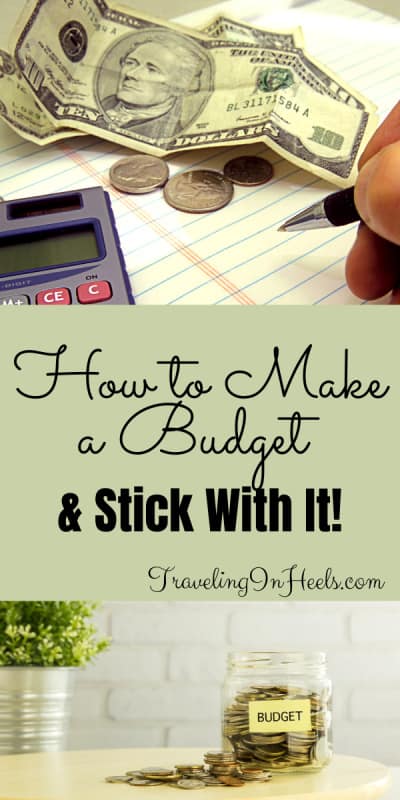As the first month of the new year slowly moves into the next month (and then the next, and the next), are you still struggling with how to make a budget? How to save money? And so many other overwhelming financial decisions? Say hello to our guest author Ann Lloyd, Student Savings Guide who offers tips on how to make a budget, pay the right way, and how NOT to blow your budget.

This post may contain affiliate links. If you click through and buy, TravelingInHeels will get a small commission. Thank you for your support!
How to Make a Budget and Stick with It!
Table of Contents
Working with a budget is crucial to your financial health. But creating a budget is one thing, and sticking to it is another.
Emergencies, temptations you hadn’t anticipated, unexpected bills, and other variables can blow a travel budget — or any kind of budget — out of the water unless you’re prepared and vigilant.
Here are some ideas on how to make a budget, and also stick with it regardless of what comes up along the way.

Stuff Those Envelopes
One effective method is completely hands-on. On payday, withdraw your money in cash and divide it up into actual envelopes. (You know, those things we used to mail letters before email came along?)
Designate each envelope for a different purpose: rent or mortgage, car payment, utilities, insurance, entertainment, travel, etc. Be sure you’ve budgeted enough to meet your monthly payments, but don’t forget to set aside envelopes for emergencies and savings, too.
Also, remember that some bills, such as property taxes and car insurance (if paid annually or every six months) may not come up monthly. Set aside money for those, too.
The envelope system was made popular by Dave Ramsey, a talk radio host, and businessman, and can serve as a useful guide for those who like to see the money in their hands. It offers the advantage of “when it’s gone, it’s gone” — creating a greater awareness of what’s available than a bank account, which can get overdrawn and result in fees you can’t afford to pay.

Use your Debit Card
A debit card is a good option if you feel safer keeping your money in the bank instead of in your home but still don’t want to risk blowing your budget.
As with the envelope system, you can’t spend money you don’t have, so once your account is out of money, you can’t incur additional debt. This is, obviously, a good thing.
But debit cards carry risks, too.
If you don’t keep track of how much money’s in your account, you can incur overdraft fees or cut into your savings account. Also, many banks require you to carry a minimum balance, and going below that figure can trigger other fees.
Debit cards also can be targets for identity theft, allowing criminals to drain your account before you even know what hit you.
Unlike with credit cards, which ensure you against this kind of theft, your money could be gone forever.
Pay with Credit
Paying with credit to stick to a budget may seem counterintuitive: It’s easy to accept a high credit limit and then change things up beyond the amount you can afford to repay.
But if you begin with a budget and stick to it, a credit card can provide you with valuable protection as well as motivation. It can also help you build credit.
Knowing your credit status and keeping an eye on your budget go hand in hand.
As mentioned earlier, major credit card companies offer a great way to protect yourself against fraud, because you’re not drawing money directly from your bank account when you use them.
Credit cards can also provide a tool for managing your budget because you can use them to group many of your expenses together and make a single payment each month.
Automatic expense records are another benefit.
There’s also another key advantage.
By building solid credit, you can pave the way for major purchases — such as a home or car — in the future. It also can help provide a buffer against major expenses you might face as the result of a health or other emergency down the road.
Building and maintaining good credit are also parts of a long-term financial strategy that can prepare you for future emergencies. Other steps you can take include gathering and safeguarding all your key financial documents so you can access them when you need them.

Use Budgeting Apps
A number of budgeting apps are available to help you stay on budget, depending on your situation.
Some, like PocketGuard and Mint, are free. Others come at a cost — which, of course, you’d need to incorporate into your (that’s right) budget.
Some options include:
- Goodbudget, a manual program that can help you create “envelopes” without linking to your bank or your plastic. It’s free, with potential upgrades.
- Mint, a popular free app that offers a budget planner, credit monitoring, and a way to track your spending.
- YNAB (stands for You Need a Budget), which works well for detailed budgeting, but comes at a cost after an initial free trial period. It brags on its website that new budgeters saved an average of $600 in their first two months.
- PocketGuard, a good option if you need to curb excessive spending. It’s free, but there’s also a premium version.
- Personal Capital, which features a wealth-management tool that helps you build your savings.
- Simplifi by Quicken, a good option for cash flow. But it carries a small monthly or annual subscription cost after a free trial period.
- Zeta, designed to help couples budget.
There are also software programs (some of which overlap with apps) available for your computer.
All these options might seem overwhelming but look at them like a buffet. You have a number of budgeting methods and tools that you can mix and match to create the perfect system for you. You’ll be not only creating your budget but also managing it to get yourself financially secure both now and in the future.
